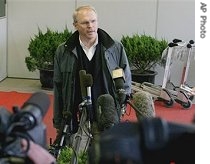-
(单词翻译:双击或拖选)
By Roger Wilkison
Beijing
29 November 2006
Officials from the United States, North Korea and China have held a second day of talks in Beijing on resuming negotiations1 aimed at dismantling2 North Korea's nuclear weapons program. From the Chinese capital, Roger Wilkison reports there was apparently3 no progress made on when the talks would resume.
---
 |
| Top American nuclear negotiator Christopher Hill speaks to the media after arriving at Beijing airport Monday 27 Nov. 2006 |
Speaking very briefly4 with reporters Wednesday evening, he said he would leave Beijing Thursday, with no follow-up meetings planned with the North Koreans.
Hill, Chinese Vice5 Foreign Minister Wu Dawei, and North Korean Vice Foreign Minister Kim Kye Gwan were supposed to lay the foundation for re-launching the negotiations, which have been stalled for more than a year.
A statement by the Chinese Foreign Ministry6 said the three men had held both bilateral7 and trilateral discussions.
North Korea began boycotting8 the six-party negotiations after the United States imposed financial sanctions on Pyongyang. Re-starting the talks have been given a new urgency following North Korea's nuclear test last month.
South Korea's Yonhap wire service and Japan's Kyodo news agency quoted sources at the talks as saying Kim set preconditions for dismantling its nuclear weapons program: that the United States lift its restrictions9 on some of North Korea's overseas bank accounts, and bring about an end to the United Nations sanctions imposed on Pyongyang after the nuclear test.
South Korea and Japan, as well as Russia, are also members of the six-party negotiations.
Peter Beck, a Seoul-based analyst10 for the International Crisis Group, says such demands reduce the chances of the talks resuming.
"…The signals that North Korea is sending is that…they're really not interested in compromising, that they want everything and then they'll talk about giving up their programs, and that's unfortunately going to be a non-starter, so it's hard to be optimistic," he said.
The United States insists North Korea should, without conditions, abide11 by the agreement in principle it made at last year's talks, to abandon all nuclear weapons in exchange for political, economic and security incentives12.
Beck, however, says now that the North is a nuclear power, it might hold out for additional concessions13.
"Given what they've been saying publicly and what they've been telling their own people, they're quite pleased and proud to be a nuclear power, and they're not going to give that up easily unless they get a lot more in return than they were being offered in the past," he said.
Hill assured Kim last month that Washington will address North Korea's concerns about the financial restrictions once the talks resume.
 收听单词发音
收听单词发音
1
negotiations

|
|
| 协商( negotiation的名词复数 ); 谈判; 完成(难事); 通过 | |
参考例句: |
|
|
|
2
dismantling

|
|
| (枪支)分解 | |
参考例句: |
|
|
|
3
apparently

|
|
| adv.显然地;表面上,似乎 | |
参考例句: |
|
|
|
4
briefly

|
|
| adv.简单地,简短地 | |
参考例句: |
|
|
|
5
vice

|
|
| n.坏事;恶习;[pl.]台钳,老虎钳;adj.副的 | |
参考例句: |
|
|
|
6
ministry

|
|
| n.(政府的)部;牧师 | |
参考例句: |
|
|
|
7
bilateral

|
|
| adj.双方的,两边的,两侧的 | |
参考例句: |
|
|
|
8
boycotting

|
|
| 抵制,拒绝参加( boycott的现在分词 ) | |
参考例句: |
|
|
|
9
restrictions

|
|
| 约束( restriction的名词复数 ); 管制; 制约因素; 带限制性的条件(或规则) | |
参考例句: |
|
|
|
10
analyst

|
|
| n.分析家,化验员;心理分析学家 | |
参考例句: |
|
|
|
11
abide

|
|
| vi.遵守;坚持;vt.忍受 | |
参考例句: |
|
|
|
12
incentives

|
|
| 激励某人做某事的事物( incentive的名词复数 ); 刺激; 诱因; 动机 | |
参考例句: |
|
|
|
13
concessions

|
|
| n.(尤指由政府或雇主给予的)特许权( concession的名词复数 );承认;减价;(在某地的)特许经营权 | |
参考例句: |
|
|
|















